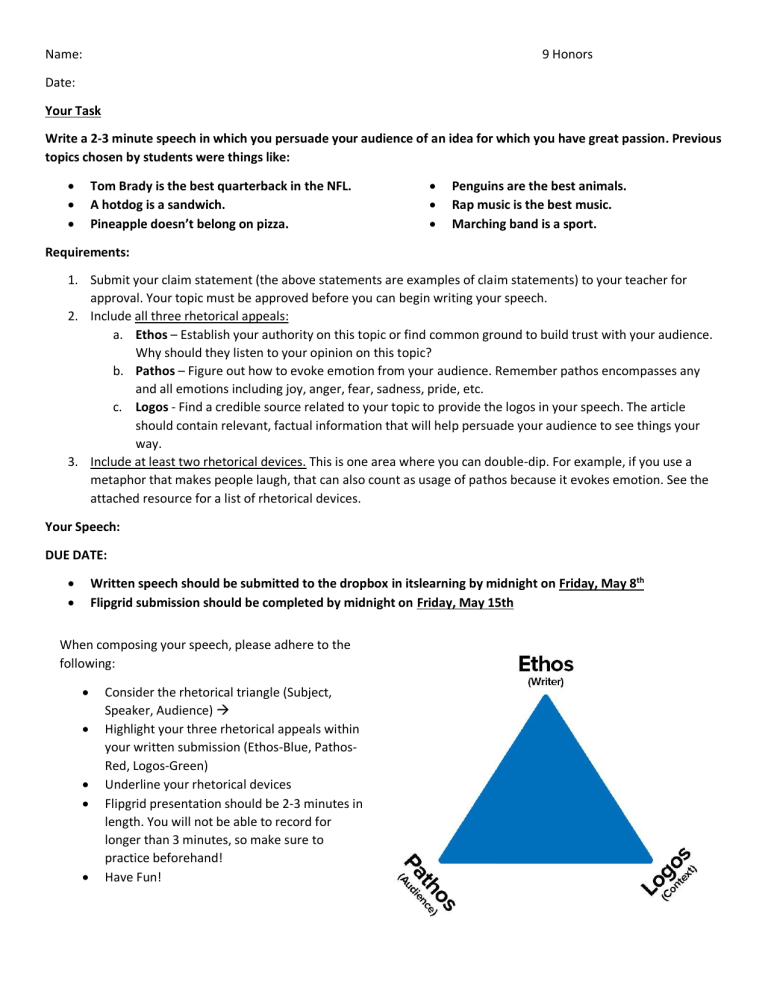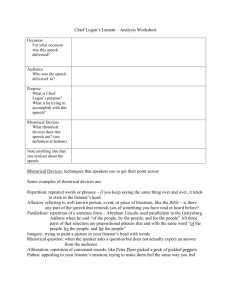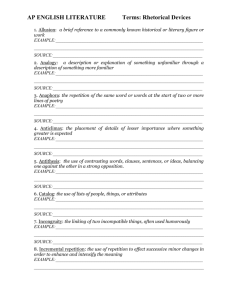Persuasive Speech Assignment: Rhetorical Appeals & Devices
advertisement

Name: 9 Honors Date: Your Task Write a 2-3 minute speech in which you persuade your audience of an idea for which you have great passion. Previous topics chosen by students were things like: Tom Brady is the best quarterback in the NFL. A hotdog is a sandwich. Pineapple doesn’t belong on pizza. Penguins are the best animals. Rap music is the best music. Marching band is a sport. Requirements: 1. Submit your claim statement (the above statements are examples of claim statements) to your teacher for approval. Your topic must be approved before you can begin writing your speech. 2. Include all three rhetorical appeals: a. Ethos – Establish your authority on this topic or find common ground to build trust with your audience. Why should they listen to your opinion on this topic? b. Pathos – Figure out how to evoke emotion from your audience. Remember pathos encompasses any and all emotions including joy, anger, fear, sadness, pride, etc. c. Logos - Find a credible source related to your topic to provide the logos in your speech. The article should contain relevant, factual information that will help persuade your audience to see things your way. 3. Include at least two rhetorical devices. This is one area where you can double-dip. For example, if you use a metaphor that makes people laugh, that can also count as usage of pathos because it evokes emotion. See the attached resource for a list of rhetorical devices. Your Speech: DUE DATE: Written speech should be submitted to the dropbox in itslearning by midnight on Friday, May 8th Flipgrid submission should be completed by midnight on Friday, May 15th When composing your speech, please adhere to the following: Consider the rhetorical triangle (Subject, Speaker, Audience) Highlight your three rhetorical appeals within your written submission (Ethos-Blue, PathosRed, Logos-Green) Underline your rhetorical devices Flipgrid presentation should be 2-3 minutes in length. You will not be able to record for longer than 3 minutes, so make sure to practice beforehand! Have Fun! Common Rhetorical Devices Simile—a comparison using like or as Example: “He is as brave as a lion.” Metaphor—a comparison using like or as Example: “Time is a thief” or “All the world’s a stage.” Personification—assigning human characteristics to something that is not human Example: “The stars danced through the moonlit sky.” Rhetorical Question—a question asked for effect, not requiring an answer Example: “If you prick us do we not bleed?” Allusion - A brief reference to a well-know person or event—often from literature, history, Greek myth, or the Bible. Can help to simplify complex ideas. Example: “He was a real Romeo with the ladies.” Hyperbole - An obvious and deliberate exaggeration (to emphasize something or for humorous purposes). Example: I told you a million times. Euphemism - A mild or pleasant word or phrase that is used in place of one that is unpleasant or crude Example: “Pass away” instead of “die” Repetition - the repetition of words or phrases to build to a climax or add emphasis Example: The repetition of “I have a dream…” throughout Martin Luther King Jr.’s “I Have a Dream” Speech Parallelism - Successive words, phrases, clauses expressed with the same or very similar grammatical structure. Can add balance and rhythm and, most importantly, emphasis to argument. Often occurs with repetition. Example: "...and that government of the people, by the people, for the people, shall not perish from the earth.”—Abraham Lincoln, Gettysburg Address Juxtaposition - Putting two contrasting elements together that are so unlike that the effect is surprising, witty, or even startling. Often occurs with parallelism. Example: "I have a dream that my four little children will one day live in a nation where they will not be judged by the color of their skin but by the content of their character.” Understatement - A statement that undermines the significance of something or says less than it means; often used for comedic effect Example: “I have to have this operation. It isn’t very serious. I have this tiny little tumor on the brain.” --J.D. Salinger, Catcher in the Rye Oxymoron - The combination of two words of opposite meaning for dramatic, comedic or provocative effect Example: “O brawling love! O loving hate!” (from “Romeo and Juliet”, Shakespeare)



